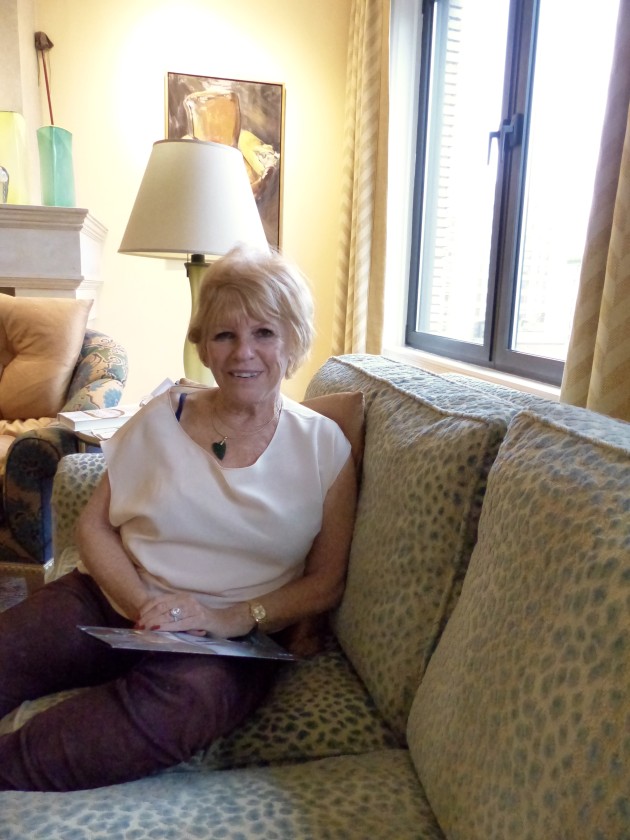The Lilith Blog 1 of 2
December 1, 2016 by Amy Stone
Carole Zabar—The Woman Behind the Other Israel Film Festival

Carole Zabar at home on Manhattan’s Upper West Side, walking distance from the Other Israel Film Festival at the JCC Manhattan and Zabar’s.
Photo credit: Amy Stone
It takes one brainy person devoted to Israel, fluent in Hebrew, with a bachelor’s and master’s from Hebrew University, and a belief in the power of film to have the confidence to create the Other Israel Film Festival. What’s becoming a New York institution began as 100 percent Carole Zabar’s baby.
When the OIFF opens Thursday night, Dec. 1, at the JCC Manhattan, it will mark the 10th year of Carole Zabar’s vision – a festival that shows Israel’s minorities, including tensions between Jews and Arabs, in features, shorts, documentaries, Israeli TV shows. She wants a festival that starts people talking and changes their views of Israeli society to something more nuanced and realistic, spurred on with Q&A’s with filmmakers, panels and well-catered receptions. Although the filter is “Palestinian Israelis and other people on the periphery,” she says, “I really want to see that they’re good films.”
Her goal is nothing short of social change. “I’m always looking at how I can grow this festival,” she said. “You can be emotionally moved by a film but I’m really interested in social change. You don’t get social change out of a film festival, so we partner with various organizations like New Israel Fund.” She’s on the board of both the New Israel Fund and the festival’s home base, the JCC Manhattan.
She explains: “How do you effect change? I grew up in the civil rights era. (Zabar was born 74 years ago in Detroit. Her mother was a socialist, her father a communist.) How did change come about? The truth is it was a long, hard slog.” One of the festival’s U.S. premieres is “The 90 Minute War,” a mockumentary with a winner-take-all soccer match deciding the Israeli-Palestinian conflict. She jokes, “It’s certainly as good as any of the other answers.”
Zabar visits Israel three times a year to scout films for the festival, working with Israeli Palestinian actor and director Mohammad Bakri. Truly part of the other Israel, the filmmaker took on the Israel Film Board and High Court over a ban on his film “Jenin, Jenin,” for one-sided coverage of Israel’s 2002 attack on the Jenin refugee camp.
Zabar’s partnership over the years with Bakri has been an eye opener for both of them. She explains, “Palestinians in general don’t really have a very good idea of Jewish history. Bakri knew nothing about anti-Semitism in America. He had never learned the things about diaspora anti-Semitism that Jews pass down to their children.” She’s been teaching herself Arabic, which is what’s spoken when she visits Bakri’s family in Israel. How fluent is she? “If I were stranded in an Arab village, I could make my way around.”
Ask Zabar about censorship in the Israeli film industry, the topic of last year’s heated OIFF panel, with Miri Regev as clear and present danger. She swiftly punctures the Israeli left’s conviction that Regev, Netanyahu’s Minister for Culture and Sport, wants to deny government funding to films critical of the Jewish homeland. Zabar doesn’t see this happening, “but the left feeds into what Regev wants from them.” Not that Zabar is neutral: “Miri Regev is such a beast. She goes after publicity. She’s there to inflame. She should be ignored.”
Zabar, an experienced criminal lawyer (she went to Fordham Law School at the age of 49), gives similar advice to JCC Executive Director Rabbi Joy Levitt when the OIFF comes under attack. The most publicized assault a few years ago came from “a man with a computer” who denounced the festival for including an organization supporting BDS (Boycott, Divestment, Sanctions against Israel). She says: “Don’t give them any oxygen. They’re going to go away.”
She definitely gives oxygen to Israeli filmmakers. So far she’s given some $450,000 to the OIFF and its outgrowth, the JCC’s Israel Film Center headed by Isaac Zablocki. Grants of up to $10,000 go to help Israeli filmmakers complete films already in rough cut.
While Carole and her husband, Saul Zabar, do their philanthropy together, she takes the lead on major projects. Their largest has been $5 million for the JCC Manhattan nursery school, which bears their name. (The Zabars have three children and four grandchildren.)
Carole met Saul when he was her Hebrew student back in 1965, just after her return from Israel. Three years later, before they married, he showed her Zabar’s, the family store. Back in 1968, it was much smaller and she was unimpressed. Since then, it’s grown into one of the holy places of the Upper West Side, a mecca for bagels and lox and the 8,000+ pounds of coffee sold weekly. (Not exactly OIFF material, the video “Zabar’s: Spilling the Beans” shows Saul Zabar in action).
As for Carole Zabar, by noon the day before the festival, she had already hosted a breakfast for the New Israel Fund and was at work getting a festival filmmaker with visa problems out of Toronto.
Details: The 10th Anniversary Other Israel Film Festival runs through Dec. 8. Most screenings are at JCC Manhattan, Amsterdam Avenue and 76th St. Additional venues: JCC Harlem, NYU, Le Poisson Rouge. Details at otherisrael.org/.
Amy Stone is a founding mother of Lilith, now a contributing editor and an ongoing Lilith blogger.
The views and opinions expressed in this article are the author’s own and do not necessarily reflect those of Lilith Magazine.
 Please wait...
Please wait...